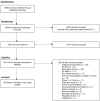Linguistic spin in randomized controlled trials about age-related macular degeneration
- PMID: 38455287
- PMCID: PMC10910936
- DOI: 10.3389/fepid.2022.961996
Linguistic spin in randomized controlled trials about age-related macular degeneration
Abstract
Objective: To evaluate the prevalence, type and extent of linguistic spin in randomized controlled trials (RCTs) exploring interventions in patients with age-related macular degeneration (AMD), as well as to investigate whether study variables were correlated with linguistic spin.
Study design and setting: PubMed was searched from 2011 to 2020 to identify RCTs including patients with AMD. Two authors independently assessed a total of 96 RCTs. Linear regression analyses were performed to investigate whether linguistic spin was correlated with predefined study variables.
Results: Linguistic spin was found in 61 of 96 abstracts (63.5%) and in 90 of 96 main texts (93.8%). Use of words pointing out the beneficial effect of a treatment and the use of '(statistically) significant/significance' without reporting a P-value or a 95% confidence interval (CI) were the most frequently identified categories of linguistic spin. Sample size was significantly correlated with the total linguistic spin score (95% CI 0.38-5.23, P = 0.02).
Conclusion: A high prevalence and extent of linguistic spin in RCTs about AMD was found. We highlighted the importance of objective reporting and awareness of linguistic spin among ophthalmologists and other readers.
Keywords: age-related macular degeneration (AMD); linguistic spin; ophthalmology; overinterpretation; randomized controlled trial.
Copyright © 2022 Veldhuis, Nuijts, Isphording, Lee-Kong, Imhof and Stegeman.
Conflict of interest statement
The authors declare that the research was conducted in the absence of any commercial or financial relationships that could be construed as a potential conflict of interest.
Figures
Similar articles
-
Visual cycle modulators versus placebo or observation for the prevention and treatment of geographic atrophy due to age-related macular degeneration.Cochrane Database Syst Rev. 2020 Dec 17;12(12):CD013154. doi: 10.1002/14651858.CD013154.pub2. Cochrane Database Syst Rev. 2020. PMID: 33331670 Free PMC article.
-
Photobiomodulation for non-exudative age-related macular degeneration.Cochrane Database Syst Rev. 2021 May 6;5(5):CD013029. doi: 10.1002/14651858.CD013029.pub2. Cochrane Database Syst Rev. 2021. PMID: 34097768 Free PMC article.
-
Spin in Published Reports of Tinnitus Randomized Controlled Trials: Evidence of Overinterpretation of Results.Front Neurol. 2021 Jul 16;12:693937. doi: 10.3389/fneur.2021.693937. eCollection 2021. Front Neurol. 2021. PMID: 34335451 Free PMC article.
-
Abstracts of randomized controlled trials in the field of dentofacial trauma: Reporting quality and spin.Dent Traumatol. 2023 Jan 13:276-284. doi: 10.1111/edt.12815. Online ahead of print. Dent Traumatol. 2023. PMID: 36639886
-
Misleading Reporting (Spin) in Noninferiority Randomized Clinical Trials in Oncology With Statistically Not Significant Results: A Systematic Review.JAMA Netw Open. 2021 Dec 1;4(12):e2135765. doi: 10.1001/jamanetworkopen.2021.35765. JAMA Netw Open. 2021. PMID: 34874407 Free PMC article.
References
LinkOut - more resources
Full Text Sources


